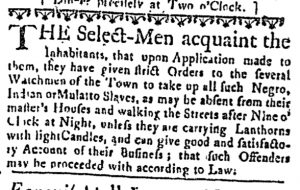Who was the subject of an advertisement in a colonial American newspaper 250 years ago today?

“Slaves, as may be absent from their master’s Houses and walking the Streets.”
Only one advertisement concerning slaves appeared in the December 25, 1766, issue of the Massachusetts Gazette. Rather than seeking to buy or sell slaves or offering rewards for runaway slaves, it aimed to regulate the activities and movements of “Negro, Indian or Mulatto Slaves” in Boston.
Apparently the selectmen of the town received complaints about slaves “absent from their master’s Houses and walking the streets” in the evenings and into the night. In response, they issued “strict Orders to the Watchmen of the Town” to detain any slaves they encountered on the street “after Nine o’Clock at Night.” The watchmen were permitted to make exceptions, provided slaves made “good and satisfactory Account of their Business.” In order to demonstrate that they were not up to some sort of skullduggery, slaves traversing the streets at that hour needed to carry lanterns with lit candles, making it easier to spot them and preventing them from seeming to sneak from place to place. The advertisement concluded with a threat against masters and slaves: “such Offenders may be proceeded with according to Law.” Advertisements for runaway slaves were intended to regulate the movements of enslaved men and women, to return them to the authority and oversight of their masters. This advertisement, on the other hand, regulated both slaves and masters, instructing slaveholders who had been lax in supervising their slaves to become more vigilant and strict.
**********
As an aside, it might seem especially appropriate today to examine the marketing aspects of an advertisement for consumer goods and services that appeared 250 years ago. After all, Christmas has increasingly become a celebration of consumerism in modern America. Isn’t this advertisement regulating the movement of slaves a missed opportunity considering all of the advertisements more explicitly linked to consumer culture?!
The Christmas holiday, however, did not garner the same attention in colonial America, especially not in New England among the descendants of Puritans. (Observing Christmas had been banned in New England in the seventeenth century.) Colonists certainly did not indulge in rampant exchanges of gifts and all of the buying and selling associated with giving presents. Accordingly, in choosing an advertisement for today I have refrained from hyping consumerism and imagining Christmas celebrations that did not exist in colonial New England. Instead, I have selected an advertisement that reveals one of the more pressing concerns in Boston on December 25, 1766.
